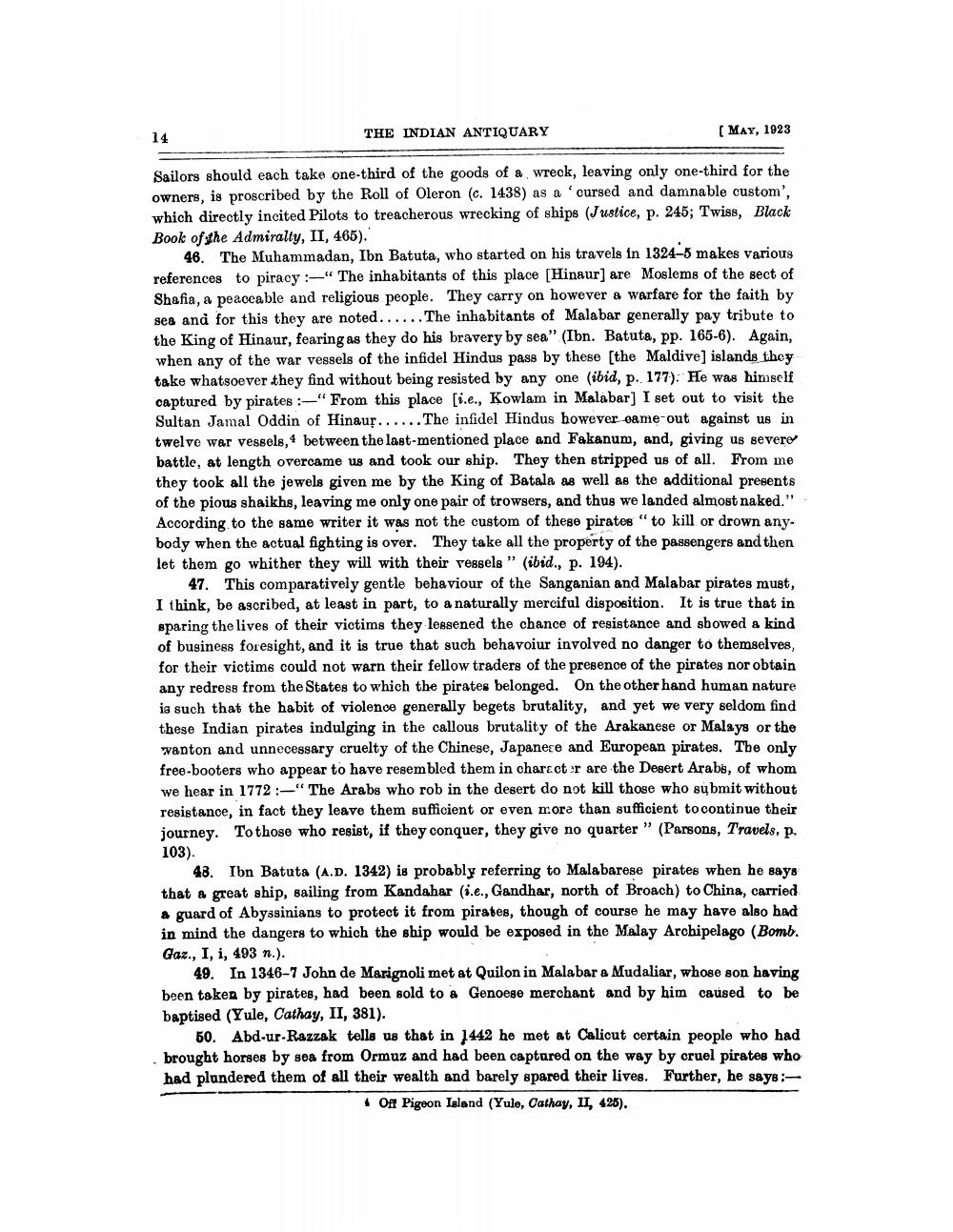________________
THE INDIAN ANTIQUARY
(MAY, 1923
Sailors should each take one-third of the goods of a wreck, leaving only one-third for the owners, is proscribed by the Roll of Oleron (c. 1438) as a 'cursed and damnable custom'. which directly incited Pilots to treacherous wrecking of ships (Justice, p. 245; Twiss, Black Book of the Admiralty, II, 465)."
46. The Muhammadan, Ibn Batuta, who started on his travels in 1324-5 makes various references to piracy :-"The inhabitants of this place (Hinaur) are Moslems of the sect of Shafia, a peaceable and religious people. They carry on however a warfare for the faith by ses and for this they are noted...... The inhabitants of Malabar generally pay tribute to the King of Hinaur, fearing as they do his bravery by sea" (Ibn. Batuta, pp. 165-6). Again, when any of the war vessels of the infidel Hindus pass by these [the Maldive] islands they take whatsoever they find without being resisted by any one (ibid, p. 177). He was himself captured by pirates "From this place [i.e., Kowlam in Malabar] I set out to visit the Sultan Jamal Oddin of Hinaur... ... The infidel Hindus however oame-out against us in twelve war vessels, between the last-mentioned place and Fakanum, and, giving us severe battle, at length overcame us and took our ship. They then stripped us of all. From me they took all the jewels given me by the King of Batala as well as the additional presents of the pious shaikhs, leaving me only one pair of trowsers, and thus we landed almost naked." According to the same writer it was not the custom of these pirates "to kill or drown any. body when the actual fighting is over. They take all the property of the passengers and then let them go whither they will with their vessels " (ibid., p. 194).
47. This comparatively gentle behaviour of the Sanganian and Malabar pirates must, I think, be ascribed, at least in part, to a naturally merciful disposition. It is true that in sparing the lives of their victims they lessened the chance of resistance and showed a kind of business foresight, and it is true that such behavoiur involved no danger to themselves, for their victims could not warn their fellow traders of the presence of the pirates nor obtain any redress from the States to which the pirates belonged. On the other hand human nature ia such that the habit of violence generally begets brutality, and yet we very seldom find these Indian pirates indulging in the callous brutality of the Arakanese or Malays or the wanton and unnecessary cruelty of the Chinese, Japanece and European pirates. The only free-booters who appear to have resembled them in charcotr are the Desert Arabs, of whom we hear in 1772:"The Arabs who rob in the desert do not kill those who submit without resistance, in fact they leave them sufficient or even more than sufficient to continue their journey. To those who resist, if they conquer, they give no quarter" (Parsons, Travels, p. 103).
48. Ibn Batuta (A.D. 1342) is probably referring to Malabarese pirates when he says that a great ship, sailing from Kandahar (i.e., Gandhar, north of Broach) to China, carried & guard of Abyssinians to protect it from pirates, though of course he may have also had in mind the dangers to which the ship would be exposed in the Malay Archipelago (Bomb. Gaz., I, I, 493 n.).
49. In 1346-7 John de Marignoli met at Quilon in Malabar a Mudaliar, whose son having been taken by pirates, had been sold to a Genoege merchant and by him caused to be baptised (Yule, Cathay, II, 381).
50. Abd-ur-Razzak tells us that in 1442 he met at Calicut certain people who had brought horses by sea from Ormuz and had been captured on the way by cruel pirates who had plundered them of all their wealth and barely spared their lives. Further, he says:
Of Pigeon Island (Yule, Cathay, II, 425).




